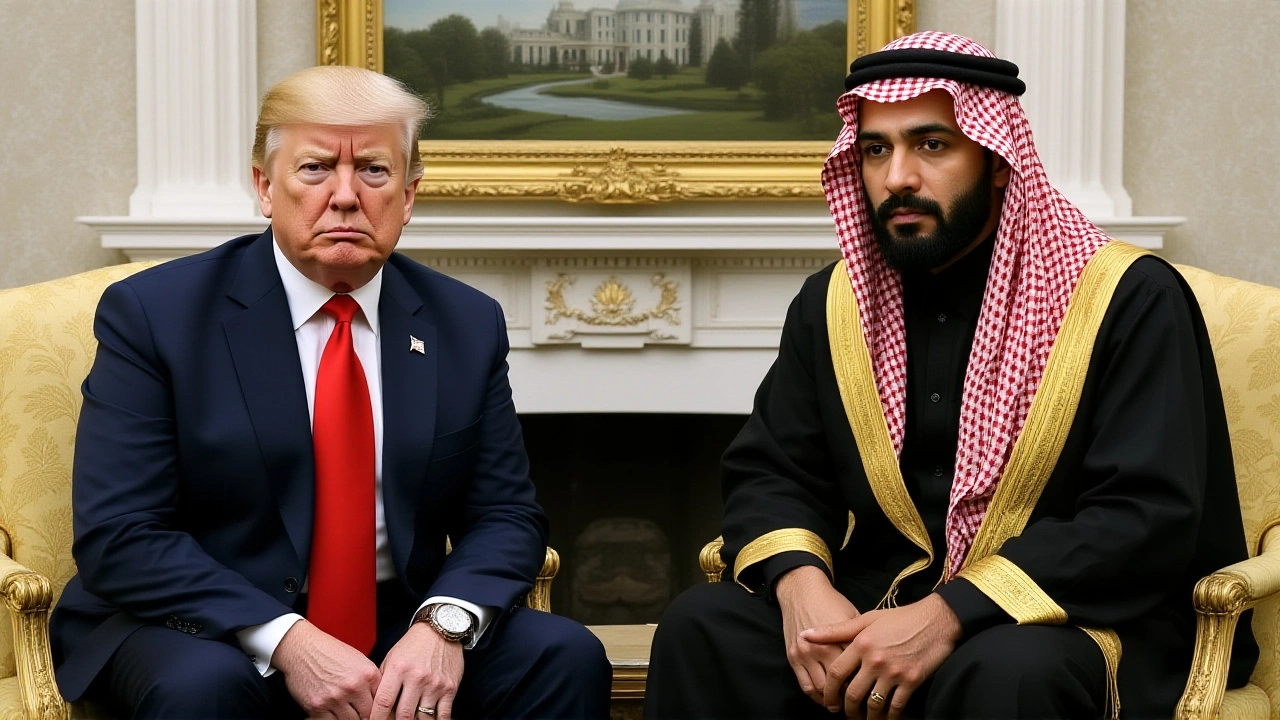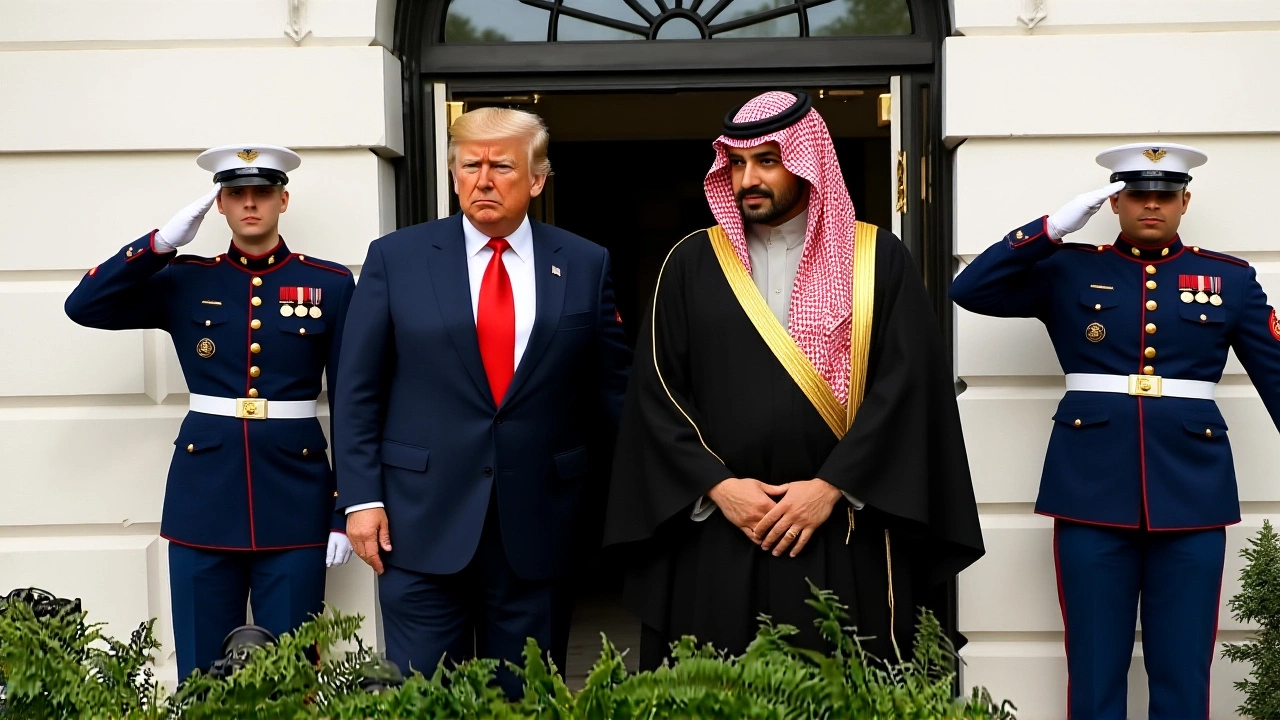On November 18, 2025, Donald J. Trump sat across from Mohammed bin Salman, Crown Prince and Prime Minister of the Kingdom of Saudi Arabia, in the White House's Oval Office — not for a photo op, but for a high-stakes reset of one of the world’s most consequential alliances. The meeting, lasting exactly 1 hour, 33 minutes, and 59 seconds, was the Saudi leader’s first visit to Washington since the 2018 killing of journalist Jamal Khashoggi, a moment that had chilled ties for years. Now, with the scent of oil and ambition thick in the air, the two leaders didn’t just shake hands — they signed off on a new era.
A New Economic Horizon: From $600 Billion to $1 Trillion
"So you are doing that now, you're saying to me now that the $600 billion will be $1 trillion?" Trump asked, leaning forward. The response was immediate: "Definitely," said Mohammed bin Salman. "Because what we are signing, it will facilitate that." The President grinned. "Good. I like that very much." That number — $1 trillion — isn’t just a rounding-up. It’s the projected value of a sweeping package of defense, energy, tech, and infrastructure deals, anchored by Saudi Arabia’s Vision 2030 plan. The kingdom, long dependent on oil, is betting its future on diversification: solar farms in the desert, AI hubs in NEOM, and now, American-made fighter jets and nuclear reactors. The scale is staggering. For comparison, the 2017 Trump visit to Riyadh yielded $110 billion in memorandums of understanding. This? It’s a quantum leap.F-35s and the Nuclear Threshold
The most sensitive item on the table? The potential sale of F-35 fighter jets. Until now, the Pentagon has only approved these stealth fighters for a handful of allies: Israel, Japan, South Korea, Australia, and NATO members. Saudi Arabia, despite decades of military cooperation, has been kept at arm’s length — partly over human rights concerns, partly over proliferation fears. But Trump’s administration appears to have moved past those barriers. "We’ve been talking about this for years," one U.S. defense official told reporters afterward. "Now, the political will is there." Equally consequential: a framework for civilian nuclear cooperation. Saudi Arabia wants nuclear energy to power its cities and desalination plants — not weapons. But the U.S. insists on strict safeguards. The agreement under discussion would include U.S. oversight, fuel leasing (so Saudi Arabia doesn’t enrich uranium), and IAEA monitoring. It’s a delicate dance. Iran’s nuclear ambitions loom large, and Washington doesn’t want Riyadh to feel pushed toward alternatives. "We’re not giving them the keys to the vault," said a State Department insider. "But we’re giving them the door."Peace Between Israel and Saudi Arabia: The Dream Within Reach
Trump didn’t mince words: "I think you have a very good feeling toward the Abraham Accords." Mohammed bin Salman replied: "Yes, definitely. Mr. President. We want peace for the Israelis, we want peace for the Palestinians. We want them to coexist peacefully in the region, and we will do our best..." The Abraham Accords, brokered in 2020, normalized relations between Israel and the UAE, Bahrain, Sudan, and Morocco. Saudi Arabia — the guardian of Islam’s holiest sites and a longtime backer of Palestinian statehood — stayed out. But now, the calculus is shifting. With Iran’s regional influence growing, and with U.S. support, Riyadh sees an opening. Normalization wouldn’t mean abandoning Palestine. It would mean leveraging influence to push for a deal. "They’re not giving up on the Palestinians," said former U.S. Middle East envoy Dennis Ross. "They’re saying: If we’re at the table, we can help shape the outcome."
Iran: The Elephant in the Room
Trump didn’t just talk about Saudi Arabia. He turned to Iran: "And by the way, Iran does want to make a deal. I can say I think they very badly want to make a deal. I am totally open to it and we're talking to them and we start a process, but it would be a nice thing..." That comment sent ripples through diplomatic circles. The Biden administration had pursued a nuclear deal with Tehran until it stalled. Trump’s openness to restarting talks — even as he deepens ties with Riyadh — suggests a dual-track strategy: isolate Iran through regional alliances while leaving the door open for diplomacy. It’s risky. Saudi Arabia has long warned that any U.S.-Iran deal must include limits on ballistic missiles and regional proxies. Whether Tehran is ready for that remains unclear.The Business Forum: 1,000 Leaders, One Message
After the Oval Office closed, the real work began. In the White House complex, roughly 1,000 executives from companies like Lockheed Martin, General Electric, Bechtel, and Saudi Aramco gathered for a business forum — the largest since 2018. Contracts were signed on the spot: $12 billion for AI-driven urban planning in Riyadh, $8 billion for renewable energy infrastructure, $5 billion for semiconductor supply chains. "This isn’t just about oil," said a senior Saudi minister. "It’s about who we become."
What This Means for the Region
The implications are vast. If Saudi Arabia joins the Abraham Accords, it could trigger a cascade: Egypt, Jordan, and even Oman might feel pressure to deepen ties with Israel. Iran’s allies — Hezbollah, the Houthis, Syria’s Assad — would lose a key diplomatic shield. The U.S. gains a stronger partner in countering Iranian influence without deploying more troops. And for the defense industry? A windfall. Lockheed Martin could see F-35 sales jump by 30% within five years.But skepticism remains. Critics point to Saudi Arabia’s record on human rights, its war in Yemen, and its crackdown on dissent. "You can’t build peace on a foundation of silence," said Human Rights Watch’s Middle East director. Yet in geopolitics, pragmatism often trumps principle. Trump’s approach has always been transactional. And for now, the transaction is working.
What’s Next?
A formal signing ceremony is expected by January 2026. The U.S. Congress will need to approve the F-35 sale — a hurdle, but not insurmountable, given bipartisan support for countering Iran. Meanwhile, Saudi Arabia is quietly engaging with Israeli officials through backchannel talks in Oman and Egypt. The White House is already drafting a joint statement on Palestinian statehood — a concession Riyadh demands before finalizing normalization.One thing is clear: the Middle East is being redrawn. Not by war, not by protest, but by a handshake in the Oval Office — and a promise of $1 trillion.
Frequently Asked Questions
Why is the F-35 sale such a big deal?
The F-35 is the most advanced stealth fighter in the world, and the U.S. has only sold it to its closest allies — Israel, Japan, and NATO members. Selling it to Saudi Arabia signals a major shift in U.S. defense policy, prioritizing strategic alignment over past human rights concerns. It would give Saudi Arabia air superiority unmatched in the region, altering the balance of power — especially against Iran and its proxies.
How does this affect the Palestinian cause?
Saudi Arabia insists it won’t normalize ties with Israel without progress on Palestinian statehood. The U.S. and Saudi officials are reportedly drafting a joint framework that would link normalization to concrete steps: a freeze on West Bank settlements, economic investment in Gaza, and renewed talks under international supervision. But critics warn that without binding commitments, this could become a diplomatic fig leaf — trading silence on occupation for military deals.
What’s the timeline for these agreements?
The civilian nuclear deal could be finalized by March 2026, pending IAEA review. The F-35 sale requires Congressional approval, which could take 4–6 months. Formal Saudi-Israeli normalization is expected by late 2026, possibly timed to coincide with the 50th anniversary of the 1976 Camp David Accords. The $1 trillion investment package will roll out in phases over the next decade, with major milestones every 18 months.
Why now? What changed since 2018?
Three things: First, Saudi Arabia’s Vision 2030 demands Western tech and defense partnerships. Second, Iran’s nuclear progress and missile tests have alarmed Riyadh more than Khashoggi’s murder. Third, Trump’s return to office removed the Biden administration’s human rights-focused constraints. For the Saudis, survival now outweighs optics. For Trump, it’s about legacy — and a historic deal.
Could this trigger an arms race in the Middle East?
Almost certainly. Turkey, Egypt, and the UAE have already signaled interest in acquiring F-35s if Saudi Arabia gets them. Iran may accelerate its own missile program or seek advanced fighters from Russia or China. The risk isn’t just escalation — it’s fragmentation. The region could see a patchwork of competing alliances, each armed with Western or Russian tech, making diplomacy harder and conflict more likely.
How does this impact U.S. global standing?
It reinforces the U.S. as the indispensable security partner in the Middle East — but at a cost. Critics argue it undermines American credibility on human rights and democracy. Supporters say it proves the U.S. can still shape outcomes through engagement, not isolation. Either way, it signals that the era of U.S. retrenchment is over — and that Washington is willing to make hard choices to maintain influence.
